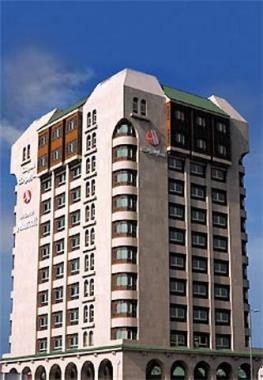Marriott Signs Agreement for Three Hotels in Madinah

The properties are scheduled to open over the next few years, contributing to Saudi Arabia's growing hospitality sector, which has seen an influx of international hotel chains seeking to tap into the Kingdom's booming tourism and religious travel industry. This initiative aligns with Saudi Arabia’s Vision 2030, a roadmap aimed at diversifying the economy and reducing its dependency on oil, with a strong emphasis on developing the tourism and entertainment sectors.
Madinah, home to the Prophet’s Mosque, one of the holiest sites in Islam, is a key destination for millions of Muslim pilgrims each year, especially during the Hajj and Umrah seasons. The city attracts a steady stream of visitors from around the world, making it an ideal location for Marriott’s latest foray into the region. As part of its development plan, Marriott intends to introduce a mix of hotel brands to cater to different segments of the market, from luxury offerings to more affordable accommodations.
The first of the three hotels will be a flagship property under the Marriott Hotels brand, reflecting the company’s commitment to providing high-end services and facilities. The second hotel will operate under the Courtyard by Marriott brand, catering to business and leisure travelers seeking comfortable yet affordable options. The third will be an addition to the Residence Inn portfolio, designed for extended stays with a focus on convenience and flexibility.
This expansion is part of Marriott’s broader strategy to capitalize on the burgeoning tourism industry in Saudi Arabia. The Kingdom’s ambitious plans to attract 100 million visitors annually by 2030 are creating significant opportunities for international hospitality brands. Marriott’s decision to expand in Saudi Arabia follows a series of agreements with the country’s Ministry of Tourism and other local stakeholders to increase the number of high-quality hotel rooms available for both domestic and international visitors.
With Saudi Arabia’s focus on developing tourism infrastructure as a central element of its Vision 2030, the hospitality industry has experienced rapid growth. The Kingdom is investing heavily in the construction of hotels, resorts, and other accommodations to meet the growing demand. Alongside this, efforts to modernize the country’s tourism services and facilities are expected to provide even more opportunities for international hotel brands like Marriott.
The signing of this agreement with Marriott underscores the confidence international companies have in Saudi Arabia’s hospitality sector. The Kingdom’s ambitious plans to boost the tourism sector and create a world-class hospitality industry have led to significant interest from global hotel chains, making it one of the most promising regions for hotel development in the Middle East.
For Marriott, this marks another milestone in its regional expansion. The company has a long-standing history of growth in the Middle East, where it operates over 80 properties across various countries. Marriott’s commitment to the Saudi market reflects its strategy to strengthen its position in the region, especially as tourism in the Middle East continues to rise. Marriott’s portfolio in the region includes a variety of brands, ranging from luxury hotels to more affordable options, which appeals to a broad spectrum of travelers.
The partnership with the Saudi government and local developers in Madinah is expected to generate numerous jobs in the region, contributing to the country’s economic growth and offering new opportunities for the local workforce. Additionally, the hotels will support the growing trend of religious tourism, providing accommodations for the millions of Muslim pilgrims who visit the city every year.
As part of its expansion strategy, Marriott has focused on establishing a presence in key cities throughout Saudi Arabia, with an emphasis on Madinah and Makkah, two of the most significant destinations for Muslim pilgrims. The company’s growth in the Kingdom is expected to continue, with more hotels and resorts slated to open in the coming years. This expansion is not only an indication of Marriott’s confidence in the Saudi market but also reflects the broader trend of international hotel chains investing in the Kingdom’s rapidly developing hospitality sector.
In addition to attracting more international hotel brands, Saudi Arabia’s Vision 2030 is positioning the country as a major global tourism hub. With its focus on increasing religious, cultural, and business tourism, the Kingdom is becoming an increasingly important destination for travelers from all over the world. As part of these efforts, Saudi Arabia has made significant investments in infrastructure, including airports, transportation systems, and entertainment venues, to cater to the growing influx of visitors.

Join the conversation